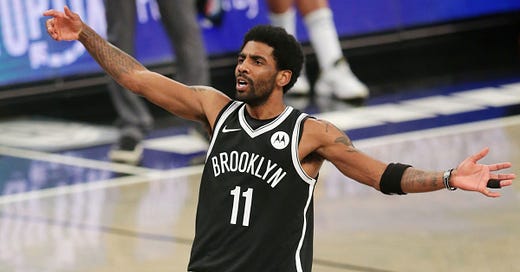If you’re like me, then you’re probably sick of vaccine discourse, but I think the ongoing Kyrie Irving saga is a helpful prism for thinking about the problems of vaccines and vaccine mandates, for a few different reasons:
1) Kyrie Irving is not part of the conservative movement.
This is obvious, but it is worth stressing because people often have a hard time seeing the vaccine debate through anything but a partisan lens. The conservative movement, through mouthpieces like Donald Trump and Tucker Carlson, HAS politicized the vaccine discourse, and there is a vocal contingent on the right that is encouraging people to resist the vaccines and defy any mandates (while often being vaccinated themselves). So there is a tendency to assume anyone who is vaccine hesitant is just an ignorant yokel echoing what they hear on conservative media.
But Irving clearly isn’t that. He’s been such an outspoken supporter of causes anathema to the right wing—Black Lives Matter, Palestinian and indigenous rights, etc.—that it has been comical to watch conservatives try to embrace his vaccine resistance. Irving may have crazy views about the vaccine, but they are not crazy right-wing views, which is a useful reminder that it is not only conservatives and Trump supporters who are resisting the vaccine, and it’s not enough to merely dismiss such resistance as a consequence of conservative media or ideology.
2) Irving’s logic is confusing and, to the extent I can follow it, pretty dumb, but not self-interested or cruel.
It’s really worth stressing how nonsensical Irving’s position actually is. If you read the story Shams Charania wrote in The Athletic (which was clearly sourced by Irving’s supporters), he says he “wants to be a voice for the voiceless,” but did not actually speak on the issue until posting on Instagram live last night, when he rambled without saying much that was coherent.
Nevertheless, it’s not as easy to dismiss Irving as it is to dismiss other vaccine doubters, many of whom are clearly motivated by financial interest or political ideology. Most annoying are people who seem to adopt a vaccine-skeptical posture to score rhetorical points against longstanding Twitter enemies. But for all Irving’s flaws, and for all his grandiosity and egocentrism, he does seem to be motivated by a genuine (and, to me at least, sympathetic) distrust of the medical establishment and the mainstream media. He is potentially sacrificing a lot of money and his whole career for his (very stupid) beliefs.
The chief problem here is individualism run amok, which is a very common sin in American capitalism. In his post last night, Irving said, “Everybody is entitled to do what they feel is what’s best for themselves,” which might as well be this country’s fucking motto. It’s a belief that is profoundly at odds with solidarity, class consciousness, and movement politics… but those are not values encouraged in our society. All of this is to say that Irving is wrong here, but not in a particularly shocking or egregious way.
3) Kyrie Irving is a flawed but sympathetic person.
This one is probably debatable, but it’s true for me. I will always respect Irving for speaking out on Palestine earlier this year, an issue on which even many anti-imperialist activists and politicians fail to stand up. And his commitment to Black Lives Matter goes beyond superficial gestures, including hopping on a Zoom for an anti-carceral DA candidate minutes before a Nets game. So there will always be a part of me that wants to defend Irving, even when he’s dead wrong on something like this.
4) It’s not obvious what should be done.
I think any basketball fan would want the NBA to keep Kyrie Irving. At the same time, vaccine mandates like the one in New York City arenas are a sensible measure in the face of the recent delta wave, and it’s not reasonable to expect the Nets to keep Irving on the roster when he’s ineligible for at least half the games. Ideally, Irving would just change his mind… but what if he doesn’t?
This raises the larger question about what happens to vaccine mandates in the long run. Right now, mandates are a useful way of ensuring rapid uptake of a new vaccine, and keeping open essential facilities, like schools and hospitals, during the recent wave of the delta variant. But that wave appears to be passing, and I’m not sure what the future for mandates is going to be. Simply hoping that everyone gets vaccinated and so the mandates become redundant doesn’t seem reasonable—even something like the MMR vaccine, which has been around for decades and is required in most schools, only has roughly 90-95% compliance. We don’t purge the other 5-10% of people from public life.
I get why people want to criticize and make fun of Irving, but in some ways it’s a way of distracting from the difficulty of dealing with someone like him. We’re going to have to find a way to live with unvaccinated people. Irving is actually a simpler case than most: He’s rich enough that he can just retire, live off his money, and only associate with people who don’t mind his vaccination status. But other unvaccinated folks don’t have that option, and I suspect we are in for a long round of debates about what jobs they can have and what public places they can go to. If the Irving discourse is any indication, it’s going to get very ugly.





Your points are well-taken, but in your view, can we be critical of Irving for making a decision that puts other people's health and lives in danger? You kinda, sorta hint at that while criticizing "individualism run amok" but don't say so expressly.
Similarly, I think the term "selfish" is thrown around a lot to describe the conduct of folks who choose not to get vaxxed because they are doing despite the obvious potential for serious harm to others. "Reckless" might be a better term.